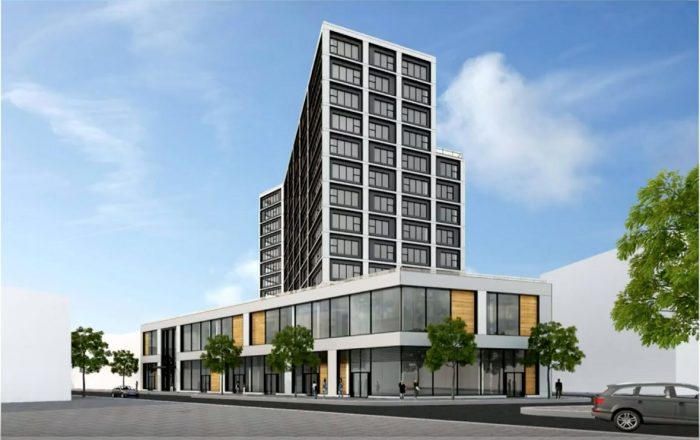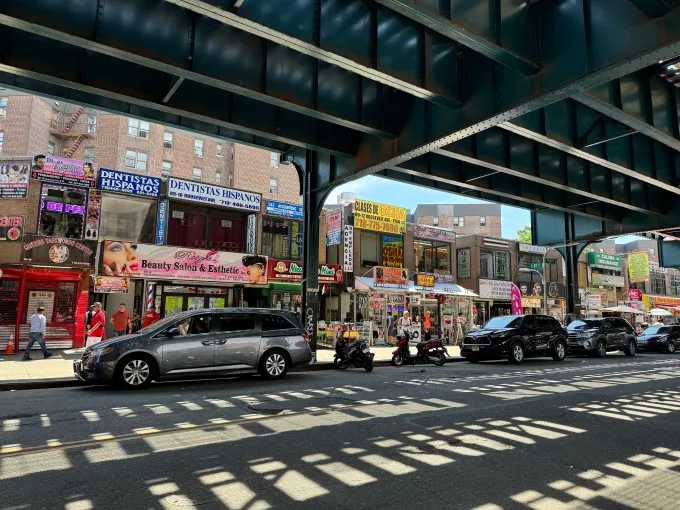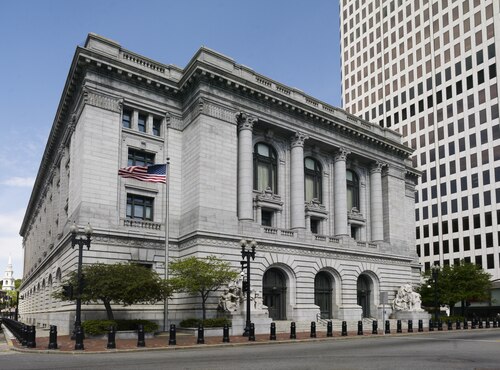
Rendering of the 82nd St. Building
July 16, 2018 By Tara Law
The developers responsible for a controversial development on 82nd Street have announced that they will withdraw their rezoning application and construct a smaller building as of right.
Sun Equity Partners and Heskel Group announced that they will withdraw their rezoning application, which would have permitted them to construct a 13-story, 120-unit building at 40-31 82nd St., the former location of the Jackson Heights Cinema.
The developers will instead move ahead and construct the as-of-right proposal— a 9-story, 77-unit building which will not include affordable housing. Several stores, including a Target, will be located on the first floor.
Prior to the developer’s announcement, it appeared that the rezoning application would be approved. Last week, the City Planning Commission— which has a binding vote on rezoning applications— approved the proposal, and the project was set to go before the City Council and the Mayor.
However, Councilmember Francisco Moya— who had backed the project and was expected to get it passed by the City Council— abruptly withdrew his support from the proposal last week. Moya then asked the developer to withdraw the plan.
The developers’ spokesperson Hank Sheinkopf released a statement soon afterwards.
“After conversations with Councilmember Moya and Assemblymember Espinal, and taking the Borough President’s recommendations into consideration, we have decided to no longer pursue this rezoning application,” Sheinkopf wrote. “We are continuing with construction as permitted under the current zoning.”
According to a report by Politico Pro, Moya decided to end his support for the rezoning after he learned that the developers intended to renege on their promise to provide a certain proportion of permanently affordable units in the building.
Moya announced in May that he would only support the rezoning if the developers agreed to increase the number of affordable units in the building. Under the deal, 42 of the 120 units would have been deemed affordable, versus the 36 the developer initially proposed.
Moya told Politico Pro Friday that the developers had decided to pursue their original plan of 36 after Moya pushed them to submit an affordable housing application to the city.
He added that he had been reluctant to support the project from the start.
“This is a project that I inherited from my predecessor in the Council. It was a terrible project to begin with,” Moya told Politico Pro. “I tried to manage it the best that we could, given the circumstances.”
Critics of the project, who include anti-gentrification activist group Queens Neighborhoods United, had campaigned for months to block the rezoning. They argued that the project would drive up real estate prices, bring new corporate competition for local businesses and clog the roadways with traffic.
Assemblymember Aridia Espinal released a press release after the announcement lauding Moya for blocking the rezoning.
“I want to thank Council Member Moya for hearing our community concerns and withdrawing his support for a project that was flawed from its inception under the previous Council Member,” Espinal said. “This was never the right proposal for our neighborhood, and we need to keep the pressure on to stop the retail development that will increase traffic and congestion in our community.”
Tania Mattos, a Queens Neighborhood United co-founder, said that she hoped that the developer’s decision would send a message to other builders.
“This sets an example for developers that they can’t rezone in our neighborhood without a fight,” Mattos said.
An activist from Queens Neighborhoods United criticized both Moya and Espinal on Facebook, arguing that the community— as well as Queens Neighborhoods United— had been responsible for ending the rezoning.
“COMMUNITY pressure made this happen and community pressure will see it through. We will not let any politicians co-opt this cause,” Queens Neighborhoods United wrote.
Queens Neighborhoods United also promised to try to undermine the Target planned for the development.
Critics of the project have argued that the Target will take business from local shops.



































